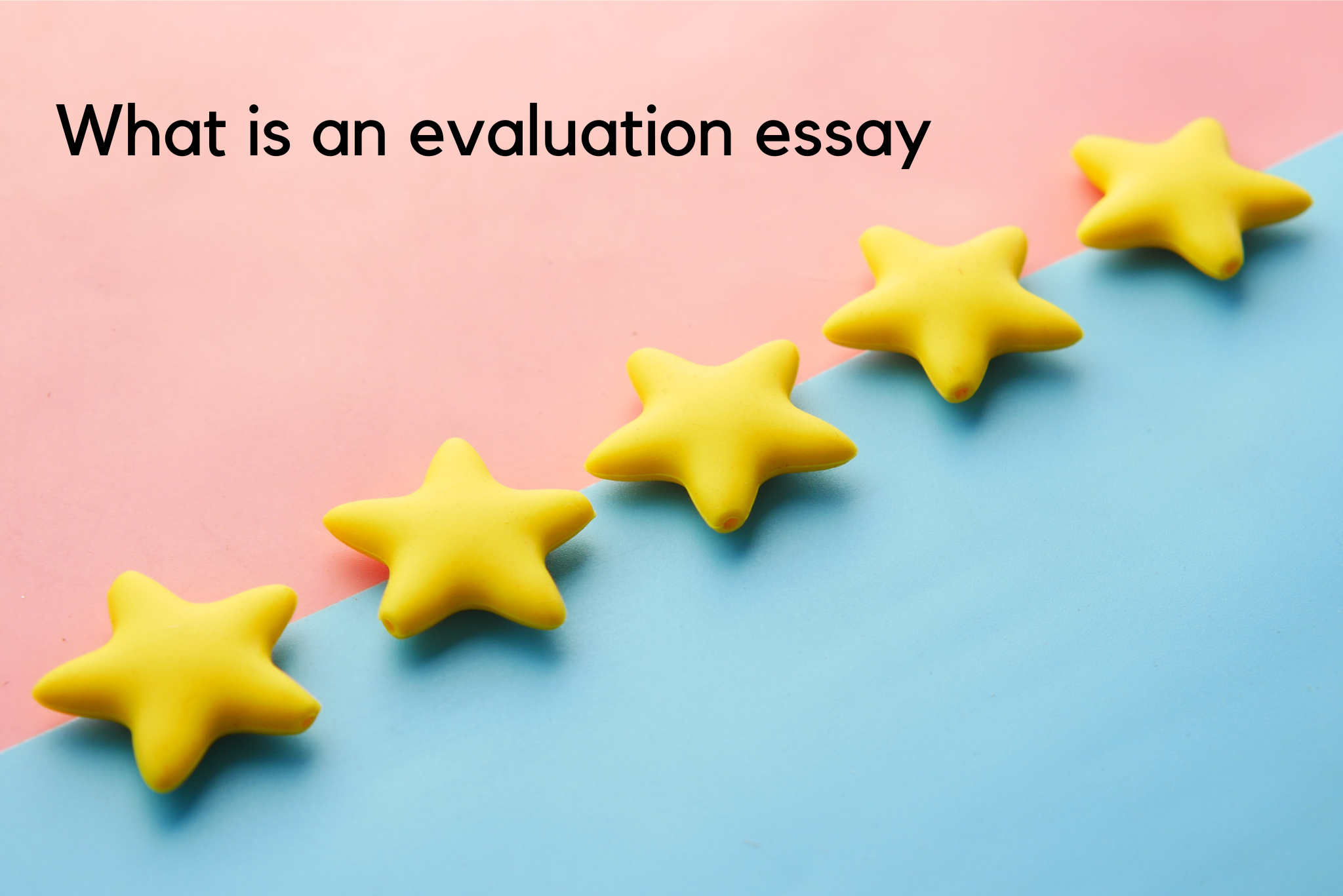Table of contents
- What is an evaluation essay?
- What does evaluation mean in an essay?
- Evaluation essay outline
- How to write a good evaluation essay: requirements
- How do you write an evaluation essay? Writing plan
- Common mistakes in an evaluation argument essay
- Video guide about evaluation essay writing
- Evaluation essay example
- Evaluation essay topics
- FAQ about evaluation essay writing
- Sources used in guide preparation process
Writing an evaluation is difficult for some students. What requirements should the text of an essay meet? How to start an evaluation essay? How to structure it? During preparation, students face difficulties – that’s why they ask questions about writing an evaluation essay, defining a concept, and evaluating it. Readers will receive answers to questions in the article, get acquainted with the requirements for custom essay writing, and learn how to structure of it.
What is an evaluation essay?
According to Merriam-Webster Dictionary, “to evaluate” means “to determine the significance.” An evaluation essay is a type of paper that includes a statement of opinion on a specific issue. This can be done in a variety of ways, and this type differs from other essay types because an evaluation essay requires the author to make a judgment on the topic rather than submitting a fact-based report. It serves to evaluate a concept, giving readers an idea of whether they should do further research on a given topic.
Evaluations must be unbiased and not contain any self-confident statements. Instead, they should only focus on the facts, as this will help make sure to eliminate personal biases that make them unreliable for the target audience.

What does evaluation mean in an essay?
First of all, you should understand that evaluative arguments center on the issue of quality. You need to answer a few questions. Is the subject good or bad? Is it honest or dishonest? Your evaluative judgments can be about values – what you consider important. Sometimes the author’s values don’t align with those of their readers, so they have to bridge the gap by respecting the opinion of the audience and clarifying points they agree with and disagree with.
A significant first step in writing your essay is to consider the appropriate criteria or standards for evaluating the subject. For example, if you are evaluating a car, you may consider standard criteria such as price, fuel economy, crash rating, etc. But you can also consider warranty, style, color, special options, and so on. Even if not all people base their car choices on secondary criteria, they are still acceptable on standard criteria.
Evaluation essay outline
“How to write my essay with a proper structure?” If you ask yourself this question, you’ll be able to answer it by reading this block. The composition of an essay consists of the following mandatory parts:
- Title page. How to title an evaluation essay? The title should indicate the name of the author and the topic of the essay, and it should give an idea of the focus of the essay. It’s a good idea to give your paper a working title to remind you of the goal (thesis) when writing the essay.
- Introductory part. The student reflects knowledge about the subject, includes an analysis of it, prepares, and brings the reader to the problem. The student has the right to interpret the key definition, describe the relevance of the topic, and talk about the phenomenon, era, and typical situation.
- Thesis statement. How to write a thesis for an evaluation essay? The student reflects what the essay will talk about. If there are several of them, then it is worth choosing the one that reveals the topic more fully. Let’s consider an evaluation essay example thesis. “Combating the effects of environmental degradation is an important aspect of the topic that can solve the problem of the subject. Therefore, the main idea might be that people should take steps to clean up the environment.”
- Main body. The significance and relevance of the controversial issue is explained. The evaluation is confirmed by several examples of the source material. Comments are evaluated and analyzed. The student determines the semantic relationship between the examples. The author’s position should be included. Reveal the author’s attitude and provide an answer to the question. Readers should understand whether the student justifies something, or, conversely, condemns. Add your own vision. The last paragraph of the main body should contains the answer: does the author of the essay agree with the evaluation of the subject? It should be accompanied by arguments. Arguments include generally known facts and information from books. It can be also biographies of influential, recognized personalities, data from films, or other cultural and historical materials.
- Final part. How to conclude an evaluation essay? Summarize the analysis, evaluate ideas and reasoning, and indicate what the subject made you think about. A student has the right to refer to the history of the development of the topic, to refer to the eternal questions, and to indicate the relevance.
Important! Each individual component takes 1 paragraph. The exception is the main body. This part should be divided into 2-3 paragraphs.
How to write a good evaluation essay: requirements
Usually, students should stick to the following requirements:
- The volume consists of 150 words or more.
- The paper contains mandatory sections of the composition. The author’s point of view is clearly stated – a personal opinion and argumentation are expressed (evaluations are provided).
- The correct definition, as well as a description of one issue, of the problem of the subject.
- An essay is not a retelling of the text – it is not a thesis plan consisting of quotations. Do not overload the text with quotes.
Gross violations include: excessive quotations and setting the wrong topic of discussion. If the student has made these mistakes, then the paper will not a get a high grade and won’t acquire high scores in a college GPA calculator.

How do you write an evaluation essay? Writing plan
In order to properly distribute the load, have time to complete the task, and comply with the requirements, it is worth working in the following order:
- Read the assignment and understand the meaning. In parallel, reveal your attitude towards the evaluation subject, note the main issue, while emphasizing value judgments and illustrative examples.
- Clearly, unambiguously formulate the question.
- Refer to the examples. Make sure the choice of example is correct: evaluate the relevance to the question. Indicate the relationship between the examples, and indicate whether the examples refute or complement each other.
- Come up with arguments that confirm the correctness of the evaluation of the main issue, understanding your position.
- Indicate a personal point of view: agreement or disagreement. Think over the arguments. Formulate the proof while conveying the essence.
- Consider the structure. Estimate the volume of each section and the ratio of sections. Divide the text into 3-5 paragraphs. The number depends on the semantic blocks and amount of work.
- Check compliance with the nuances. The introductory and final sections together make up 1/3 of the work. The conclusion takes 2-3 sentences. The problem is formulated clearly and unambiguously. Objectivity is transferred. The examples are linked. They are accompanied by reasoning and explanations. In the personal opinion section, the position is clearly indicated and the rationale is given.
Important! Before submitting, read the essay from beginning to end. It is worth adding information in a draft if the evaluation is not full.
Common mistakes in an evaluation argument essay
These are the most common mistakes regarding organization and content:
- Failure to follow the sequence of writing. The essay is built in accordance with the established composition – that’s why it is compared with a puzzle. If you do not start the work from the first point, then you will lose the logical flow of actions, and readers will not understand the meaning of the work.
- The work does not meet the verification criteria for evaluation essay. In the second chapter, students make common mistakes: they equate or confuse the concepts of the topic, ideas, or problem. That’s why the problem is erroneously determined. They indicate and evaluate a number of problems in the text, which is wrong. The paper should evaluate one subject.
- Example mismatch. The arguments do not correspond to the meaning; they refute the vision of the student. Alternatively, the argument solves a related dilemma.
- Lack of reasoning after expressing an opinion. Opinions need to be fixed; reasoning on the topic should be given. Substantiate thoughts; refer to information from films, scientific facts, books, and biographies of famous people.
- Simple, unsystematic preparation. The scoring scale contains a number of evaluation points, among them: compliance with grammatical, spelling, punctuation, and other rules. Therefore, the student should study to define the problem and identify examples, repeating the rules. Expand your horizons to clearly formulate your own opinion.
Note! The more accurate the information given as an argument, the higher the score the essay will receive.
Video guide about evaluation essay writing
Evaluation essay example
You will be surprised how amazingly the following evaluation essay sample is written. It is precisely such essays that are remembered and attract attention. We at EssayShark.com have decided to present you a sample of an evaluation essay, which will be popular with readers.
When It Is Medically Ethical To End A Life
The end-of-life stage is an unavoidable phase that we will all ultimately face. In the healthcare setting, medical professionals have the responsibility to provide direct patient care for all types of patients, including those that are terminally ill or, in simple terms, are actively dying. The National Hospice and Palliative Care Organization defines the word end-of-life as the period “when a person has been diagnosed with a terminal illness with less than 6 months to live, and curative treatments are no longer options” (Huffman and Harmer, 2022). Planning and delivering care to patients with terminal diagnoses requires serious medical and ethical considerations. Most patients undergo palliative care and are entitled to participate in the decision involving advanced derivatives. The primary objective of palliative care is to provide symptom control, improve patient experience, and enhance the understanding of their diagnosis and prognosis (Teoli & Kalish, 2022). Advance derivatives include the authorization of a Do Not Resuscitate order, wherein the attending physician acknowledges the patient’s request to dismiss resuscitation to avoid further suffering.
Patients diagnosed with chronic and terminal diseases, especially those with progressive cases and that are at the end-of-life stage, may suffer from a variety of complications, including physical discomfort, psychosocial distress, and spiritual concerns. As their condition progresses, the need for medical assistance and utilization of health services becomes more frequent. The purpose of end-of-life care for dying patients is to alleviate as much pain and suffering as possible while honoring the patients’ wishes. This concept has led many health care practitioners to face many ethical challenges, wherein they must consider the importance of protecting the patient’s rights and dignity, including all relevant parties involved in the decision-making process.
End-of-life care involving premature death is a controversial topic in healthcare that has steered moral dilemmas and debate concerning the role of such medical interventions. Euthanasia is the name given to this procedure, technically described as the “hastening of death of a patient to prevent further sufferings” (Annadurai et al. 2022). It comprises a range of subcategories, from the purposeful injection of deadly medications to the discontinuation or delaying of life-sustaining medical therapies. Passive withholding of life-supporting treatments is generally more accepted worldwide than actively inducing death through medications. Practicing active euthanasia in certain countries may be considered a criminal homicide. It may put the medical professional at risk of imprisonment or the loss of the license to practice.
Theoretically, to legally perform this method, the patient’s voluntary consent, or at least the consent of an immediate family member, must be obtained. Although some medical experts say that indications of suicidal thoughts and insufficient palliative care may contribute to a patient’s desire for euthanasia, physical and psychological elements must be addressed throughout the decision-making phase. For patients seeking euthanasia, take note of their physical conditions that significantly affect the quality of the patient’s life, including unbearable pain, persistent nausea and vomiting, difficulty swallowing, irreversible paralysis, incontinence, and ventilatory dependence. These physical symptoms could be associated with psychological distress, including depression and persistent feelings of burden or shame from being “too dependent.”
Accepting the idea of inducing death medically could lead to misinterpretation and arguments that the healthcare system embraces the concept of giving the patients the entitlement to a dignified death. The purpose of euthanasia is to provide patients relief from distressing symptoms by ending their life prematurely. This method is contrary to the oath and ethical principles of medical practitioners, including those regarding the responsibility to maximize a patient’s quality of life, providing life-sustaining treatments and remedies for chronic illness, which is supposed to give rise to an expectation of a longer life with less suffering.
References
1. Ahizen R. Suffering, Authenticity, and Physician Assisted Suicide. Springer: Medicine, Health Care, and Philosophy. Retrieved from https://www.ncbi.nlm.nih.gov/pmc/articles/PMC7426309/.
2. Akdeniz, Mehalat et.al. Ethical Considerations at the End-of-life Care. SAGE Journals. Retrieved from https://journals.sagepub.com/doi/full/10.1177/20503121211000918.
3. Annadurai, Kalaivani et.al. Euthansia: Right to Die with Dignity. Journal of Family Medicine and Primary Care. NCBI. Retrieved from https://www.ncbi.nlm.nih.gov/pmc/articles/PMC4311376/.
4. Evenblij, Kirsten et.al. Factors Associated with Requesting and Receiving Euthanasia: A Nationwide Mortality Follow-back Study with a Focus on Patients with Psychiatric Disorders, Dementia, or an Accumulation of Health Problems Related to Old Age. BMC Medicine. Retrieved from https://bmcmedicine.biomedcentral.com/articles/10.1186/s12916-019-1276-y.
5.Huffman, Jaime L. and Harmer B. End of Life Care. National Library of Medicine. StatPearls. Treasure Island. Published on 2022 January. Retrieved from https://www.ncbi.nlm.nih.gov/books/NBK544276/#:~:text=The%20National%20 Hospice%20and%20Palliative,treatments%20are%20no%20longer%20options.
6. Lai, Xioa Bin et.al. The Experience of Caring for Patients at the End-of-life Stage in Non-palliative Care Settings: A Qualitative Study. BMC Palliative Care. Retrieved from https://bmcpalliatcare.biomedcentral.com/articles/10.1186/s12904-018-0372-7.
7. Teoli Dac and Kalish Virginia B. Palliative Care. National Library of Medicine. StatPearl. Retrieved from https://www.ncbi.nlm.nih.gov/books/NBK537113/.
Evaluation essay topics
We’ve created a list of topics for an evaluation argument essay that you’ll like. They will help people to prepare for evaluation essay writing. You will find a topic that will be interesting to write on. Here are good evaluation essay topics:
- See the role of smartphones in reimagining long-distance communications.
- Evaluate several works by the same writer and look for similarities between them.
- How does social media influence our personal relationships?
- Analyze a historical film and discuss its main themes.
- What is the impact of the Internet on a student’s learning process?
- Physical or digital textbooks: what is the better option for schools?
- Evaluate the advantages and disadvantages of remote learning programs.
- Assess the causes of global warming.
- How does tutoring and mentoring influence learning?
- How essential is physical education in school?
FAQ about evaluation essay writing
How do you start an evaluation essay?
Firs of all, you need to choose a topic. Then, develop your thesis. After that, you should consider the criteria used in order to make the correct judgment. Don’t forget to gather supporting evidence to present your point of view.
What does an evaluation essay consist of?
An evaluation essay consists of three key components: judgment, criteria, and evidence. Present these elements using the four key components of an essay: it begins with an introduction containing a thesis that presents your opinion and focuses your assessment. After that, you need to include the main body with a detailed evaluation of the subject. The final part is the conclusion, where you sum up everything that has been said in your essay. These are the main components. If one of them is absent, your essay won’t get a good grade.
How do you write a body of an evaluation essay?
Present the topic in an interesting way. Add the right amount of details: you need to clearly explain what it is and present enough information for readers to agree with your judgment. You should make a clear and authoritative judgment. Also, you should argue your opinion.
What is an evaluation paragraph?
In this paragraph, you present judgments about ideas, people, and possible actions. You must make your assessment based on certain criteria that you develop. In an evaluation paragraph, you should state your assessment or recommendation, and then support it with a relation to your criteria.
What is an example of evaluation?
Evaluation is defined as an appraisal of the worth or value of someone or something. A simple example of evaluation is when a teacher reviews work to grade it.
Sources used in guide preparation process
- “Tips and Examples for Writing Thesis Statements,” Purdue Online Writing Lab by College of Liberal Arts.
- “Writing a Paper: Outlining,” Writing Center by Walden University.
- “Writing Evaluation: What Can Analytic Versus Holistic Essay Scoring Tell Us?” by ScienceDirect.
If you have a problem with writing an evaluation essay, you can always get help on EssayShark.com. Our writers understand how to write this type of essay correctly. While writing, they stick not only to basic rules but to your personal requirements as well. You will deal with your assignment successfully if you get our help!
Photo by Monfocus from Pixabay









